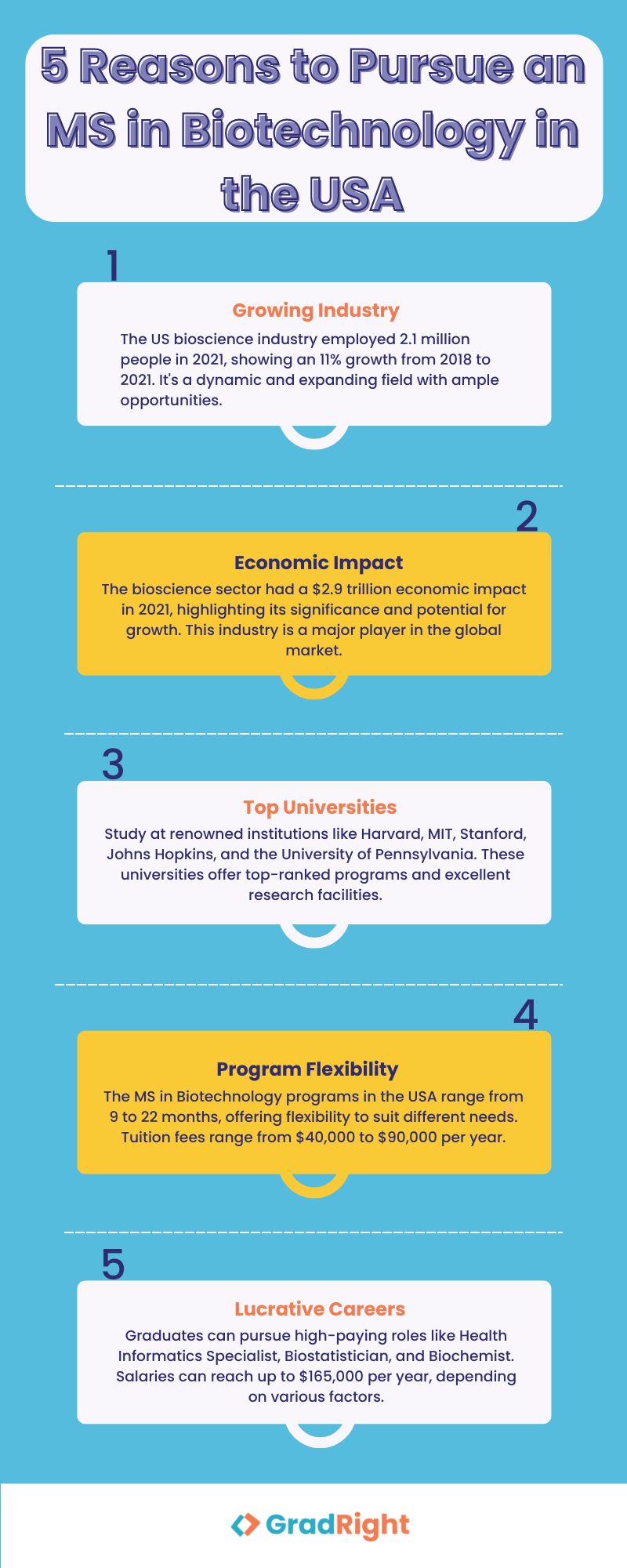Pursuing an MS in Biotechnology in the USA offers many advantages and opportunities. The bioscience industry in the USA is a major player in the global market. In 2021, it employed 2.1 million people across 127,000 businesses. From 2018 to 2021, the industry saw an 11% growth in employment, showing how dynamic and expanding it is. Additionally, the bioscience sector had an economic impact of $2.9 trillion in 2021, highlighting its importance and potential.
Studying biotechnology in the USA means you will be part of a growing and influential industry, with access to top-ranked universities, excellent research facilities, and strong job opportunities.
Top universities in the USA to study an MS in Biotechnology program include Harvard University, MIT, Stanford University, Johns Hopkins University, University of Pennsylvania,
University of California San Francisco, etc.
The duration of the program may vary depending on the university. It can range from as short as 9 months to as long as 22 months. The tuition fee for an MS Biotechnology program at a USA university ranges from $40,000 to $90,000 per annum.
After completing the program, graduates of MS in Biotechnology can pursue roles like Health Informatics Specialist, Biostatistician, Bioinformatics Technician, Biochemist, Microbiologist, etc. Students can earn salaries as high as $165,000 per annum or even higher, depending on the university they graduate from, experience, location, and other relevant factors.

Top universities in the USA for an MS in Biotechnology (with tuition fees, rankings, and
application deadlines)
Here’s a list of the top 10 universities in the USA for an MS in Biotechnology:
| Universities | U.S News Ranking 2024 for Biotechnology and Applied Microbiology | QS World University Ranking 2025 – Overall | Relevant Programs | Intake/ Application Deadline | Tuition (Program Fee) |
| Harvard University | 1 | 4 | Biotechnology Master’s Degree Program | 22nd July – 29th Aug for Fall 2024 | $40,080 |
| Massachusetts Institute of Technology (MIT) | 2 | 1 | Professional Certificate Program in Biotechnology & Life Sciences | 1st June – 31st July 2024 | — |
| Stanford University | 3 | 6 | MS in Bioengineering | 1st December 2024 | $50,812 |
| Johns Hopkins University | 6 | =32 | MS in Biotechnology | 1st December 2024 | $54,200 – 56,200 |
| University of Pennsylvania | 10 | 11 | Master of Biotechnology | 16th September 2024 – 1st April 2025 for Summer 2025 | $87,920 |
| University of California San Francisco | 21 | — | Biotechnology, PSM (Professional Sciences Master’s) | 15th October 2024 | $59,760 |
| University of California Berkeley | 22 | 12 | Master of Biotechnology | 15th January 2025 for Summer 2025 | $70,000 |
| University of Illinois, Chicago | 53 | =365 | MS in Medical Biotechnology | 15th July for Spring Intake and 15th February for Fall Intake | $63,298 |
| Ohio State University | 57 | 208 | Master of Science in Biomedical Engineering | — | — |
| Columbia University | 67 | =34 | MS with a Concentration in Biotechnology and Biopharmaceuticals | 15th October for Spring Intake | — |
Next, let’s find out more about some of these top universities.
1. Harvard University
Website: https://www.harvard.edu/
Ranking: #1 in the U.S News Ranking 2024 for Biotechnology and Applied Microbiology and #4 in the QS World University Ranking 2025 – Overall
The Master’s degree program in Biotechnology at Harvard University helps students gain an understanding of biotechnology principles, business and commercial functions, research and innovation, drug development and its regulatory aspects, and financial evaluation and analysis.
Some recent graduates of this program have held roles as Antibody Engineers, Senior R&D Managers, Data Scientists, Biotechnology Engineers, Field Application Specialists, and Computational Biologists.
Top organizations that hire graduates from the university include Boston Children’s Hospital, Wyss Institute, New England BioLabs, Broad Institute, Pfizer, and Novartis.
Application Deadline:
Applications for Fall 2024 admissions at Harvard University open on 22nd July and close on 29th Aug 2024.
Application fee for international students: $85
Tuition fees for international students: $40,080 for the Biotechnology Master’s Degree Program (overall).
2. Stanford University
Website: https://www.stanford.edu/
Ranking: #3 in the U.S News Ranking 2024 for Biotechnology and Applied Microbiology and #6 in the QS World University Ranking 2025 – Overall
The MS in Bioengineering program at Stanford University can be completed in 45 units. This program is a great option for students interested in pursuing careers in the biotechnology, medicine, engineering, and healthcare sectors.
Applicants must have a cumulative GPA of at least 3.5 in their bachelor’s degree to be considered for admission to the university.
Application Deadline: 1st December 2024
Application fee for international students: $125
Tuition fees for international students: $50,812 for the MS Bioengineering program (overall)
3. Johns Hopkins University
Website: https://www.jhu.edu/
Ranking: #6 in the U.S News Ranking 2024 for Biotechnology and Applied Microbiology and =#32 in the QS World University Ranking 2025 – Overall
MS in Biotechnology at Johns Hopkins University is delivered by the Krieger School of Arts & Sciences. The program takes 12–36 months to complete and requires 10 courses to graduate.
Some of the popular job titles (with salary packages) after completing an MS in Biotechnology at JHU are:
| Job Titles | Median Wage (Annual) |
| Health Informatics Specialist | $103,314 |
| Biostatistician | $103.433 |
| Bioinformatics Technician | $70,363 |
| Biochemists | $106,931 |
| Microbiologist | $85,273 |
Application Deadline: 1st December 2024
Application fee for international students: $75
Tuition fees for international students: $54,200–56,200 for the MS in Biotechnology program
How to choose the best MS in Biotechnology University in the USA?
You need to consider various factors when choosing the best MS in Biotechnology program in the USA.
Here are some things you must check about a university:
- Past performance/ overall reputation of the biotechnology programs
- Program curriculum (a balance of practical and theoretical learning would be great)
- Facilities or infrastructure
- Faculty expertise
- The university’s industry connections
- Placement or internship opportunities
- Alumni success stories
- Support services for international applicants or students
- Campus culture
After you’ve assessed a university in all the above-mentioned aspects, you can finalize one.
We understand that this level of thorough research might be extremely time-consuming and confusing, given the sheer number of university options. That’s why we came up with an AI-powered tool called SelectRight to simplify the entire process for you.
Considering factors like the university’s reputation, location, faculty, cost, curriculum, career prospects, and more, SelectRight identifies the right match for your educational journey.
The algorithm that powers SelectRight considers more than eight million data points from over 40,000 programs to build a shortlist of the most highly-suited universities for you.
If you’re preparing for the Spring ‘25 admission season, now is the right time to create your free profile on SelectRight.
Application process to the top USA Universities for an MS in Biotechnology
There’s no standard application process for an MS in Biotechnology at the top USA universities.
However, to help you get a gist of how the entire application process works, we have mentioned some common steps below:
| Steps | Description |
| Research Universities | Identify universities with strong biotechnology programs. Consider faculty expertise, research facilities, industry connections, and location. |
| Standardized Tests | Prepare and take the GRE, if required. Non-native English speakers should take TOEFL or IELTS. |
| Transcripts | Collect official transcripts from all previous academic institutions. |
| Letters of Recommendation | Obtain 2-3 recommendation letters from academic or professional references. |
| Statement of Purpose | Write a detailed essay outlining your academic goals, research interests, and reasons for choosing the program. |
| Resume/CV | Highlight relevant academic, research, and professional experiences. |
| Application Form & Fees | Complete and submit the online application forms for each university and the required fees. |
| Submit Test Scores | Arrange for official GRE and TOEFL/IELTS scores to be sent to the universities. |
| Financial Aid & Scholarships | Research and apply for scholarships, assistantships, and other financial aid options. |
| Interviews | Participate in interviews if required by the program, either in-person or online. |
| Track Application Status | Monitor the status of your applications through university portals and follow up on any additional requirements or documentation. |
| Decision & Acceptance | Wait for admission decisions, confirm enrollment, and complete necessary formalities like visa applications. |
NOTE: We advise checking your prospective university’s official website for precise information.
Major specialization for an MS in Biotechnology at top universities in the USA
From bioprocessing to regenerative medicine, the top universities in the USA offer many specializations for an MS in Biotechnology. Here are some of them:
| Most Popular Specializations | Universities Offering the Specialization |
| Molecular Biotechnology | Harvard University, Stanford University, University of California – Berkeley |
| Biomedical Engineering | Massachusetts Institute of Technology (MIT), Johns Hopkins University, University of California – San Diego |
| Bioprocessing and Biomanufacturing | North Carolina State University, Purdue University, University of Delaware |
| Genomics and Bioinformatics | University of California – San Francisco, University of Pennsylvania, Cornell University |
| Environmental Biotechnology | University of Michigan, University of Wisconsin-Madison, University of Washington |
| Pharmaceutical Biotechnology | University of Southern California, Rutgers University, University of Illinois at Urbana-Champaign |
| Industrial Biotechnology | Northwestern University, University of Minnesota, University of Florida |
| Plant Biotechnology | University of California – Davis, Michigan State University, Texas A&M University |
| Regenerative Medicine | University of Pittsburgh, Duke University, University of Miami |
| Biotechnology Management | Carnegie Mellon University, Georgetown University, University of California – Irvine |
Eligibility for studying an MS in Biotechnology at top universities in the USA
There are no specific criteria that every university in the USA follows for the MS in Biotechnology admissions. However, you can check out some common requirements below and prepare yourself for the applications:
| Eligibility/Selection Criteria | Description |
| Bachelor’s Degree | A Bachelor’s degree in Biotechnology, Biology, Chemistry, or a related field from an accredited institution. |
| Minimum GPA | Generally, a minimum GPA of 3.0 on a 4.0 scale, although some programs may have higher requirements. |
| Standardized Tests | GRE scores are often required. Competitive scores vary by university. |
| English Language Proficiency | For non-native English speakers: TOEFL (usually 90+), IELTS (usually 7.0+), or equivalent English proficiency test. |
| Letters of Recommendation | Typically, 2-3 letters from academic or professional references. |
| Statement of Purpose | A detailed essay outlining academic goals, research interests, and reasons for choosing the specific program. |
| Resume/CV | Highlighting relevant academic, research, and professional experiences. |
| Prerequisite Coursework | Completion of foundational courses in biology, chemistry, and biotechnology. |
| Research Experience | Prior research experience is highly recommended and sometimes required. |
| Interview | Some programs may require an interview as part of the admissions process. |
Other than these, you must produce documents to prove your financial ability to cover tuition and living expenses. You will also have to pay an application fee, which is non-refundable in many universities.
GMAT/GRE requirements for studying an MS in Biotechnology in the USA
GMAT is, typically, not a requirement for an MS in Biotechnology program in the USA. GRE may also be either optional or not required. Here are some examples of universities in the USA with a very different stance on GRE/GMAT scores being a part of the selection process:
- Harvard, Stanford, and Johns Hopkins require you to submit your GRE scores. Your GRE scores are expected to be above the 60th to 70th percentile for such high-ranking universities.
- The GRE is optional for admission to the University of California, Berkeley.
- The University of Illinois, Chicago, on the other hand, does not require you to submit your GRE scores.
Scholarships to study an MS in Biotechnology in the USA
Many scholarships help you fund up to 100% of your MS in Biotechnology cost in the USA.
You can either go for general scholarships or university-specific scholarships. For the latter ones, you’ll have to check with your school department. However, most universities automatically consider all applicants for their merit-based scholarships. If an admission application meets university-specific scholarship criteria, you will receive a scholarship.
On the other hand, for general scholarships, you will have to apply separately, usually from the official portals of individual scholarships. The award and other perks will depend completely on the strength of your candidature.
You can explore the following scholarships for an MS in Biotechnology in the top USA universities:
- Fulbright-Nehru Master’s Fellowships
- Stanford Reliance Dhirubhai Fellowships
- Narotam Sekhsaria Foundation Scholarship
- AAUW International Fellowships
- Inlaks Shivdasani Foundation Scholarships
- Tata Scholarship for Cornell University
Education loans for an MS in Biotechnology in the USA
You can obtain an education loan to study for an MS in Biotechnology at a top university in the USA from various financial institutions and banks. Some top banks (public or private) you can explore for your ed-loan are SBI (State Bank of India), Bank of Baroda, HDFC Credila, Axis Bank, and more.
However, finding the right lender with the best terms can be time-consuming and overwhelming. This is where FundRight comes in to simplify the process. With just one application, FundRight compares factors like interest rates and repayment plans from over 15 top lenders in India and abroad. The FundRight team even negotiates with the lenders on your behalf to secure an education loan with the best terms.
Here’s how FundRight makes the process easier in five simple steps:
- Sign up on the FundRight platform and fill in your personal, academic, and financial details.
- Enter your course details, institution information, and specific financial needs.
- FundRight provides you with multiple loan offers from top lenders, tailored to your requirements.
- Evaluate the loan offers based on interest rates, repayment terms, and other factors. Consult with FundRight’s financial experts if needed.
- Complete your application and securely upload all required documents. Wait for loan approval, which typically takes about 10 days.
Benefits of studying an MS in Biotechnology in the USA
Here are 3 reasons why pursuing an MS in Biotechnology at the top USA universities will benefit you:
- Some of the top globally-ranking universities in biotechnology are in the USA. These include Harvard University, MIT, Stanford University, etc. As per the QS World University Rankings by Subject (Biological Sciences), these universities rank among the top 5, globally.
- The Bureau of Labor Statistics projects a 7% growth from 2020-2030 for the biotechnology sector in the USA. It also states that the median wage of a Biophysicist or a Biochemist is $107,460 per annum. Apart from this, top USA universities have strong ties with biotech giants like Gilead Sciences, Amgen, Genentech, etc.
- In 2022, the NIH (National Institutes of Health) had a research budget of $45 billion. This is a testament to how heavily the country invests in biotechnology research. Students interested in research programs after completing their MS in Biotechnology can get ample opportunities in universities like MIT, UC San Diego, etc.
Career and job opportunities after an MS in Biotechnology in the USA
After completing an MS in Biotechnology from top USA universities, the career and job opportunities are immense.
You may work with recruiters like Boston Children’s Hospital, Wyss Institute, New England BioLabs, Broad Institute, Pfizer, and Novartis.
Your salary may range from $37,000 to $165,000+ per annum, depending on your role, employer, skills, location, etc.
Here are some top job roles you may explore after an MS in Biotechnology in the USA:
| Job Roles | Median Wage (per annum) |
| Health Informative Specialist | $103,314 |
| Natural Sciences Manager | $157,747 |
| Clinical Research Coordinator | $157,747 |
| Biodiesel Technology and Product Development Managers | $164,837 |
| Clinical Data Managers | $107,043 |
| Medical Appliance Technicians | $44,657 |
| Animal Scientists | $69,659 |
| Agricultural Engineer | $88,754 |
| Biomedical Engineers or Bioengineers | $100,773 |
| Cytogenic Technologists | $60,738 |
FAQs
1. What’s the tuition for an MS in Biotechnology at the top universities in the USA?
Ans. Studying an MS in Biotechnology at a top USA university can cost you a tuition of $40,000 – $90,000 for an entire program. This amount does not include the cost of living. That may vary highly depending on your lifestyle.
2. How much can I earn after completing an MS in Biotechnology in the USA?
Ans. Your salary after completing an MS in Biotechnology from a USA university may vary depending on various factors like your job role, work experience, university, specialization, employer, etc. However, the median wage per annum can vary from $37,000 to $165,000 or more.
3. Do I need to submit my GRE scores for an MS in Biotechnology at the top universities in the USA?
Ans. Some US universities require students to submit their GRE scores, whereas some don’t. Some, on the other hand, keep it optional. High-ranking universities like MIT, Stanford, Johns Hopkins, etc, require a percentile of 60-70 or higher.


















